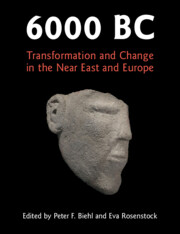Book contents
- 6000 BC
- 6000 BC
- Copyright page
- Contents
- Contributors
- Acknowledgments
- Introduction
- Part I Upper Mesopotamia and Eastern Mediterranean
- Part II Anatolia
- Part III Aegean and Marmara
- Chapter 13 Aegean Turkey from the Mid-7th to Early 6th Millennium cal BC
- Chapter 14 The Beginning and the Development of Farming-Based Village Life in Northwestern Anatolia
- Chapter 15 Regional Styles and Supra-regional Networks in the Aegean
- Chapter 16 The Turn of the 7th Millennium in Greece
- Part IV Southeast Europe
- Part V Modeling the Change
- Part VI Commentaries
- Index
- References
Chapter 13 - Aegean Turkey from the Mid-7th to Early 6th Millennium cal BC
A Tale of Change within Continuity
from Part III - Aegean and Marmara
Published online by Cambridge University Press: 30 April 2022
- 6000 BC
- 6000 BC
- Copyright page
- Contents
- Contributors
- Acknowledgments
- Introduction
- Part I Upper Mesopotamia and Eastern Mediterranean
- Part II Anatolia
- Part III Aegean and Marmara
- Chapter 13 Aegean Turkey from the Mid-7th to Early 6th Millennium cal BC
- Chapter 14 The Beginning and the Development of Farming-Based Village Life in Northwestern Anatolia
- Chapter 15 Regional Styles and Supra-regional Networks in the Aegean
- Chapter 16 The Turn of the 7th Millennium in Greece
- Part IV Southeast Europe
- Part V Modeling the Change
- Part VI Commentaries
- Index
- References
Summary
This chapter focuses on the changes in several key aspects of daily life in prehistoric societies from the mid-7th to early 6th millennium cal BC in Aegean Turkey. Archaeological investigations in the region, primarily at Ulucak in Izmir, attest that abrupt cultural changes, fundamentally altering the way of life, did not occur during the time period in question. On the contrary, cultural components evolved gradually and novel elements continuously appeared in different spheres of life. By focusing on subsistence patterns, storage practices, shifts in settlement layout, clues of social differentiation, ritual practices and involvement in exchange networks, this chapter aims to demonstrate that epoch-making, sudden changes induced by natural or external social agents are not identifiable in the archaeological record.
- Type
- Chapter
- Information
- 6000 BCTransformation and Change in the Near East and Europe, pp. 213 - 230Publisher: Cambridge University PressPrint publication year: 2022



